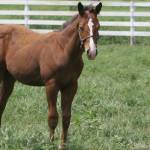Tips for Feeding Weanling Horses

Weaning is synonymous with stress. The process produces anxiety among foals and mares, not to mention their caretakers. To ease the transition all foals must face—from maternal coddling to self-sufficiency among peers—owners can do a little homework before the day of parting arrives.
Here are four tips that may soothe the anxiety of all parties involved.
1. Foals should be consuming concentrate before weaning occurs. This is generally not a problem as foals are often snatching grain from their dam’s feed tub by four or six weeks of age. Though amount will vary depending on the type of feed as well as the individual, a weanling could receive up to one pound (500 grams) of feed per day for every month of age. If a foal is weaned at five months of age, for example, it could be given approximately five pounds (2.5 kilograms) of feed per day. Be sure to feed a product that is formulated expressly for growing horses.
2. Keep weanlings in familiar surroundings and move mares to a new location. Because of their age and experience, mares are less likely to hurt themselves in a new environment. Plus, mares are usually more respectful of boundaries and fences than are frenzied young horses. Weanlings will be excited by the loss of companionship, but by keeping them in an area that is known to them, they won’t have any problem finding a water source and salt, which may prove especially beneficial during the dog days of summer.
3. Don’t get too caught up in the notion of a growth slump following weaning. Yes, it’s perfectly normal for growth to be less accelerated immediately following weaning (you’ll know this by weighing and measuring the height of your foals regularly), but a veterinary examination is in order if a weanling significantly lags its peers in development.
4. Stress is thought to precipitate the development of gastric ulcers at time of weaning. Signs of gastric ulcers include poor appetite, dull coat, slow growth, and a sour disposition. To keep ulcers at bay, consider supplementing weanlings with a product specifically designed to protect the stomach from the damaging effects of excessive gastric acid. Lucerne (alfalfa) hay has been shown to have an antacid effect and to reduce the incidence of gastric ulcers and is the hay of choice for a weanling. Those weanlings that show the signs listed above can be treated with omeprazole to aid healing of gastric ulcers.








